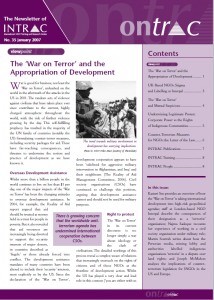 War is good for business, not least the ‘War on Terror’, unleashed on the world in the aftermath of the attacks in the US in 2001. The random acts of violence against civilians that have taken place ever since contribute to the current, highly charged atmosphere throughout the world, with the risk of further violence growing by the day. This self-fulfilling prophecy has resulted in the majority of the UN family of countries (notably the US) formulating counter-terror measures, including security packages for aid. These have far-reaching consequences, and threaten to undermine the notion and practice of development as we have known it.
War is good for business, not least the ‘War on Terror’, unleashed on the world in the aftermath of the attacks in the US in 2001. The random acts of violence against civilians that have taken place ever since contribute to the current, highly charged atmosphere throughout the world, with the risk of further violence growing by the day. This self-fulfilling prophecy has resulted in the majority of the UN family of countries (notably the US) formulating counter-terror measures, including security packages for aid. These have far-reaching consequences, and threaten to undermine the notion and practice of development as we have known it.
In this issue of ontrac, Kasturi Sen provides an overview of how the ‘War on Terror’ is taking international development into high-risk geopolitical agendas, staff at London-based NGO Interpal describe the consequences of their designation as a ‘terrorist’ organisation, whilst Najma Sadeque recounts her experience of working in a civil society organisation under military rule. Also in this issue Martin Scurrah writes about how the Peruvian media, mining lobby and authorities labelled indigenous organisations ‘terrorist’ in a dispute over land rights and Joseph McMahon analyses the implications of counterterrorism legislation for INGOs in the US and Europe.
Download:
ONTRAC 35. The 'War on Terror' and the Appropriation of Development
.pdf (0.43mb)
Download:
ONTRAC 35. The 'War on Terror' and the Appropriation of Development. Arabic
.pdf (0.31mb)
Download:
ONTRAC 35. The 'War on Terror' and the Appropriation of Development. Chinese
.pdf (0.24mb)
Download:
ONTRAC 35. The 'War on Terror' and the Appropriation of Development. Portugese
.pdf (0.07mb)
Download:
ONTRAC 35. The 'War on Terror' and the Appropriation of Development. Russian
.pdf (0.45mb)
Download:
ONTRAC 35. The 'War on Terror' and the Appropriation of Development. Spanish
.pdf (0.11mb)